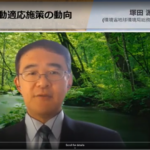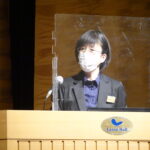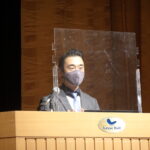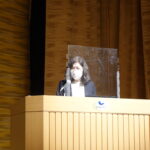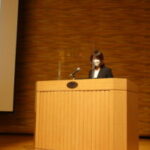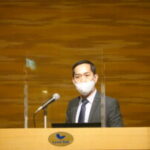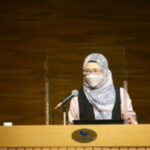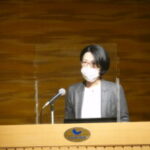13 February 2022, Kobe, Hyogo – APN, in collaboration with the Asian Disaster Reduction Center, Japan International Cooperation Agency Kansai Center, and the Graduate School of Disaster Resilience and Governance, University of Hyogo, held an online forum titled “Climate Change x Disaster Reduction – Considering sustainable recovery in the context of SDGs”. The forum was held with Japanese and English simultaneous interpretation, where 54 Japanese listeners and 47 English listeners participated from Japan and abroad.
In recent years, extreme weather disasters are increasing in frequency worldwide, and climate change is referred to as a “climate crisis”. In reaction, the Hyogo Prefecture has been integrally implementing climate change mitigation measures and adaptation measures to minimise the impacts of climate change. Based on experiences of various disasters, such as the Great Hanshin-Awaji Earthquake and the concept of SDGs, it is believed that we are required to explore more resilient recovery processes to prepare for future disasters.
The forum brought together institutions located in “HAT Kobe”, a symbol reconstruction project from the Great Hanshin-Awaji Earthquake, and utilised their resources to provide an opportunity for participants to consider sustainable recovery in the context of SDGs.
Mr Yoichi Toyama, Director of the APN Secretariat, gave his opening remarks by introducing the joint message “Climate Change x Disaster Reduction” by the Cabinet Office and the Ministry of the Environment, Government of Japan, to effectively and collectively work on climate change countermeasures and disaster reduction/mitigation countermeasures. Additionally, Mr Toyama introduced that the Hyogo Prefecture is also taking measures to minimise the impacts of climate change by integrally implementing climate change mitigation and adaptation measures.
-1024x576.png)
In part one of the forum, the following four experts provided the latest developments from central and prefectural governments, and research outcomes on urban development in consideration of sustainable recovery.
- Mr Gen’ichiro Tsukada, Director, Climate Change Adaptation Office, Ministry of the Environment, Government of Japan, on “Climate change adaptation efforts by the Ministry of the Environment, Japan”.
- Ms Kotoko Uenishi, Director, Global Warming Solutions Division, Environmental Management Bureau, Agricultural and Environmental Affairs Department, Hyogo Prefectural Government, on “Climate change adaptation measures in Hyogo Prefecture”.
- Dr Tomohiro Tabata, Associate Professor, Graduate School of Human Development and Environment, Kobe University, on “Disaster resilient cities from the perspective of SDGs”.
- Prof. Michiko Bamba, Graduate School of Disaster Resilience and Governance, University of Hyogo, on “Resilient land use and housing”.
In part two of the forum, the following four experts presented case studies in Japan and abroad on local communities.
- Prof. Mayumi Sakamoto, Graduate School of Disaster Resilience and Governance, University of Hyogo, on “Creating sustainable community through community based disaster management plan”.
- Dr Gerald Potutan, Senior Researcher, Asian Disaster Reduction Center, on “Disaster resilient community: Case study in the Philippines”.
- Dr Nafesa Ismail, Programme Officer, APN Secretariat, on “Disaster resilient community: Case study in Banda Aceh, Indonesia”.
- Ms Chieko Kajisawa, Director, Program Division 1, JICA Kansai/Disaster Reduction Learning Center, on “Human resource development to support community-based disaster risk reduction in developing countries”.
Lastly, Prof. Michiko Bamba closed the forum by stating that under the present state where climate change is causing serious impacts on the planet, we are required to think globally and take action individually, and conveyed her hope that the forum provided tips for implementation.
After the forum, a survey was conducted. Forty per cent of the participants responded excellent and good, respectively, on the overall conduct of the forum, indicating that in total, 80 per cent of the participants were satisfied with the forum. Additionally, participants provided comments such as “the forum provided concrete cases on disaster and contributed to the understanding of efforts made on disaster countermeasures nearby” and “when climate disaster risks are increasing, it is necessary for industries, governments, academia and the private sector to collaborate further.
APN will continue to make efforts to deepen the understanding of environmental issues with the residents of Hyogo Prefecture by collaborating with the Hyogo Prefectural Government, research institutions and other institutions concerned.
To see the programme of the event, please click here.
